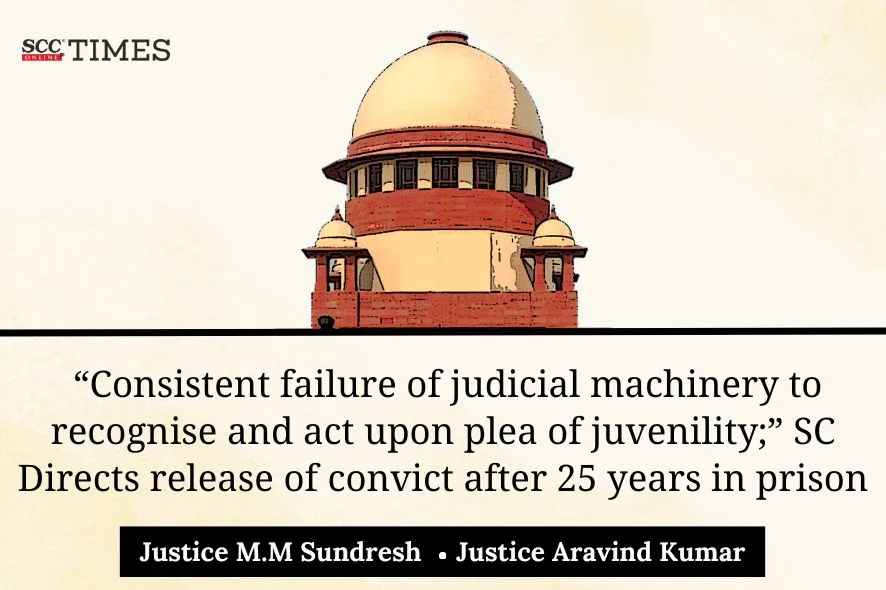Supreme Court: While deliberating over the instant case wherein the Division Bench of M.M Sundresh* and Aravind Kumar, JJ., observed grave injustice that had been perpetrated on account of consistent failure on part of the judicial machinery to recognise and act upon the constitutional mandate vis-a-vis the plea of juvenility in the instant case and allowed the appeal and set aside the appellant’s sentence imposed in excess of the upper limit for commission of culpable homicide amounting to murder in 1994.
In the instant case, the Court found that the appellant had undergone imprisonment for almost 25 years, during which time, the society has undergone significant transformation which the Appellant might be unaware of and find difficult to adjust with. Therefore, the Court directed the Uttarakhand State Legal Services Authority to play a proactive role in identifying any welfare scheme of the State/Central Government, facilitating the Appellant’s rehabilitation and smooth reintegration into the society upon his release, with particular emphasis on his right to livelihood, shelter and sustenance guaranteed under Article 21 of the Constitution.
Background:
The appellant was charged for the offence of culpable homicide amounting to murder for an incident that occurred on 15-11-1994 After his conviction, he raised the plea of juvenility during the hearing on sentence by stating that he was a minor at the time of occurrence. The appellant was illiterate. The Trial Court, while relying upon his statement regarding opening of a bank account, presumed that he was a major and sentenced him to death, overwhelmed by the nature of the crime.
On an appeal to the High Court, the Appellant was represented by an Amicus Curiae and an attempt was again made to raise the plea of juvenility by stating that the Appellant was required to be tried by a Juvenile Court and be given the benefit of being a juvenile. Once again, the bank account and the cheque book were relied upon, and the High Court was also persuaded by the offence committed.
When the matter reached the Supreme Court, the appellant relied on the birth certificate issued by the Dariya Para Bodinath Board School dated 28-04-2001; however, the Supreme Court dismissed the appeal and the subsequent review petition. Therefore, the appellant then filed a Mercy Petition Governor of the State of Uttarakhand, but that was rejected as well.
Thereafter, the appellant’s parents along with a social worker filed a writ petition before the Supreme Court was dismissed with liberty to invoke the curative jurisdiction. Accordingly, a Curative Petition was filed and by way of a counter affidavit to the Curative Petition, Respondent 2 herein, reiterated the fact that the Appellant was 14 years of age on the date of the occurrence. Unfortunately, this Curative Petition was also dismissed.
After the amendment incorporating Section 7-A into the Juvenile Justice (Care and Protection Of Children) Act, 2000, the Appellant’s mother filed a Mercy Petition before the President of India. During the pendency of the said Mercy Petition, the 2007 Rules, came into effect. By the Presidential Order dated 08-05-2012, the death sentence of the Appellant was commuted to life imprisonment, with a caveat that he shall not be released until the attainment of 60 years of age. An application under the Right to Information Act, 2005 was filed thereafter by the Appellant, through which information was obtained from the bank that any minor above 10 years of age can have an independent bank account, provided he knew how to read and write, and also that no cheque book was issued for the bank account opened in the name of the Appellant.
A subsequent Curative Petition filed by the appellant was rejected by the Registry as not maintainable. In the year 2019, the Appellant filed a Writ Petition before the High Court invoking Article 226 of the Constitution, laying a challenge to the Presidential Order while seeking yet another relief on the basis of Section 9(2) of the Juvenile Justice (Care and Protection of Children) Act, 2015. By a comprehensive judgment, the Writ Petition was dismissed by the High Court inter alia holding that the power of judicial review over an executive order passed in exercise of Article 72 of the Constitution is limited, and the proceedings against the Appellant had attained finality.
Court’s Assessment:
Perusing the facts of the case, the Court pointed out that the facts have spoken for themselves. The Court said that at every stage, injustice has been inflicted by the Courts, either by ignoring the documents or by casting a furtive glance. The Appellant despite being illiterate, raised this plea one way or another, right from the trial Court up to the conclusion of the Curative Petition before the Court.
The Court further stated that the approach of the Courts in the earlier round of litigation cannot be sustained in the eye of law. There can be no reliance on the statement recorded under Section 313 of CrPC.
The Court explained that when the plea of juvenility was raised, it should have been dealt with under the existing laws at the relevant point of time, especially when there exists a tacit and clear admission as to the age of the Appellant.
“As the Executive cannot be construed to have undertaken an adjudication on the determination of the age of the accused, and with the first prayer being a distinct one invoking Section 9(2) of the 2015 Juvenile Justice Act, we feel that the High Court has committed an error in its reasoning. We would only state that this is a case where the Appellant has been suffering due to the error committed by the Courts”.
The Court therefore set aside the excess of the upper limit of the sentence imposed on the appellant while maintaining the conviction rendered. The Court clarified that it is not a review of the Presidential Order, but a case of giving the benefit of the provisions of the 2015 Act to a deserving person, as the issue that the Court was concerned with, is the failure of the Court in not applying the mandatory provisions of the 2015 Act with specific reference to the plea of juvenility.
Taking note of the plea of juvenility raised the appellant and grave injustice done on part of the Courts while dealing with this aspect, the Court directed the Appellant’s release.
Important Observations on the Plea of Juvenility and Court’s Duty:
While dealing with the instant matter, the Court relying on relevant Constitutional and statutory provisions and precedents, pointed out that when procedural law stands in the way of the truth, the Court must find a way to circumvent it. Similarly, when substantive law, as it appears, does not facilitate the emergence of the truth, it is the paramount duty of the Court to interpret the law in light of its teleos. Such an exercise is warranted in a higher degree, particularly while considering a social welfare legislation.
“The Court is a search engine of truth, with procedural and substantive laws as its tools”.
Vis-a-vis juveniles committing crimes; the Court pointed out that the Court is expected to play the role of parens patriae by treating a child not as a delinquent, but as a victim, viewed through the lens of reformation, rehabilitation and reintegration into the society.
Vis-a-vis Juvenile Justice Act of 2000 the Court stated that Section 7-A deals with the procedure to be followed when a claim of juvenility is raised before any Court, Section 20 of the 2000 Act is a special provision in respect of pending cases. Under both these provisions, it has been made abundantly clear that the 2000 Act and the relevant rules would also be applicable to a juvenile who ceased to be so on or before the commencement of the 2000 Act. Thus, a retrospective application has been facilitated under the 2000 Act.
When an improved version of the afore-stated Act in the form of Juvenile Justice Act, 2015 was enacted by the legislature, the Court pointed out that Section 9 became the very substance of the entire enactment, with Section 9(2) being pari materia to Section 7-A of the 2000 Act.
The Court explained that the plea of juvenility can be raised before any Court, meaning thereby that there is no question of finality in this regard until and unless an application filed, invoking this provision, is determined in accordance with the 2015 Act and the relevant Rules. When such a plea is raised, it shall be recognised and cannot be brushed aside in a casual or whimsical manner. A due determination must be made by judiciously considering the material available on record. The Court is expected to travel an extra mile to satisfy its conscience as to whether the case on hand would attract the provisions of the 2015 Act and, for the aforesaid purpose, the process enumerated thereunder will have to be necessarily followed. The proviso further clarifies that the that the 2015 Act and the relevant Rules are applicable even if a person who has been accused of an offence, has ceased to be a child on or before the date of the commencement of the 2015 Act.
The Court further explained that merely because a casual adjudication has taken place, it does not mean that a plea of juvenility cannot be raised subsequently. This is for the simple reason that the plea of juvenility has not attained finality. So long as the right of a party subsists, one can never say that finality has been attained. In a case where a plea has been raised, but not adjudicated upon, the decision rendered thereunder would not amount to attaining finality.
Since the need for taking care of a juvenile in conflict with law is mandated by the Constitution, the role of the constitutional Courts is significant. “Even after the dismissal of a Special Leave Petition/Statutory Criminal Appeal followed by incidental proceedings before this Court, where the plea of juvenility was not consciously considered, there would be no bar on the constitutional Courts to consciously take a deeper look. Doing so is not an exercise of the powers conferred under Articles 32, 136 or 226 of the Constitution, but an act in fulfilment of a mandated duty enjoined upon the Courts, to give effect to the laudable objective of a social welfare legislation”.
Vis-a-vis judicial review of Presidential Order, the Court explained that Courts will have to exercise adequate caution and circumspection while dealing with an executive order passed in exercise of the power conferred under Article 72 or 161 of the Constitution. The Court clarified that when a challenge is made to an executive order, with an independent prayer for exercising the power under Section 9(2) of the 2015 Act, they, being distinct and independent, refusal of judicial review of the former will not obliterate the mandatory duty pertaining to the latter.
CASE DETAILS
|
Citation: Appellants : Respondents : |
Advocates who appeared in this case For Petitioner(s): For Respondent(s): |
CORAM :





